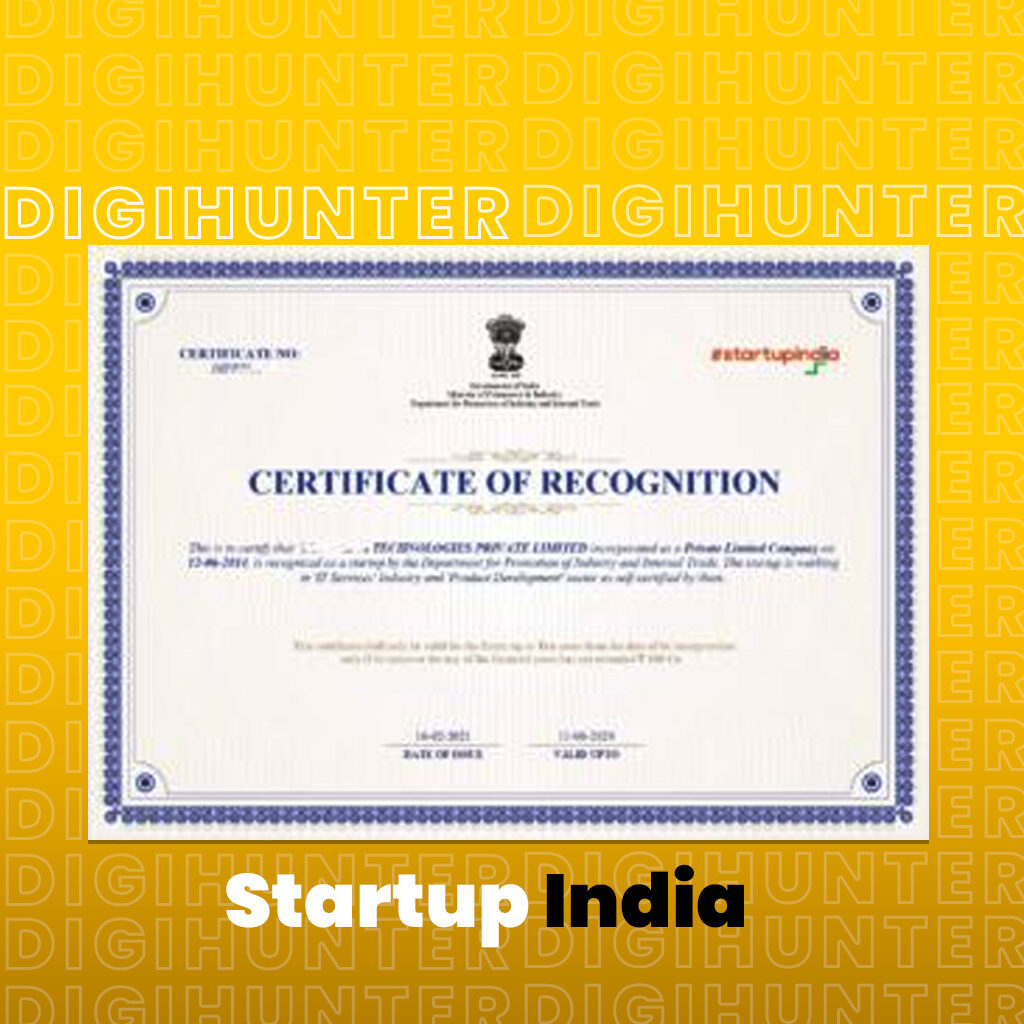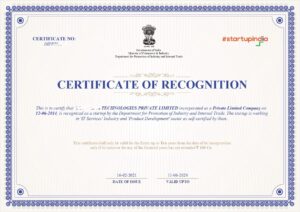Startup India

Government Issued Documents
- Startup India Recognition
Documents Required
- Proof of Funding
- Documents of Awards
- Patent documents
- Description of Business
- Incorporation Certificate
Startup India Recognition
Startup India is an Indian Government initiative that is intended to build a strong eco-system for nurturing innovation and startups in the country to drive sustainable economic growth and generate large scale employment opportunities. Through this initiative, the government aims to empower Startups to grow through innovation and design.
The objectives of the Startup India Movement are outlined below. The action plan envisages supporting the startups and more:
- Enhanced infrastructure, including incubation centres
- IPR facilitation, including easier patent filing
- The better regulatory environment, including the tax benefits, easier compliance, improved setting up of a company, fastest mechanism and more.
- A goal to increase the funding opportunities
- Provide a vast networking database for the entrepreneurs and other stakeholders in the startup ecosystem.
Eligibility Criteria
The startup must meet the following eligibility criteria to avail the DPIIT Certificate of Recognition:
- Period of Existence of Entity: The Period of existence and operations of the company should not exceed 10 years from the date of formation
- Type of Entity: The DPIIT Certificate of Recognition is provided for the company which is incorporated as a Private Limited Company, a Limited Liability Partnership (LLP) or a Registered Partnership Firm.
- Annual Turnover: To get the DPIIT Certificate of Recognition, The firm should have an annual turnover of Rs. 100 crore for any of the fiscal years since its federation
- Original Entity: To avail the DPIIT Certificate of Recognition, the company should not have been incorporated by splitting up or recreating an already existing entity.
- Innovative & Scalable Entity: The entity should be working towards development or improvement of a product, process or service.
- The entity should have a scalable business model with high potential for the creation of wealth and employment. The firm should have the potential to generate employment or create wealth.
Procedure to get DPIIT Certificate
The entity should follow the below-mentioned simple steps to get the DPIIT certificate of recognition.
Incorporation of the Business
As stated above, the entity must first incorporate the business as a Private Limited Company or a Partnership firm or a Limited Liability Partnership (LLP).
Get in touch with Digi Hunter to register your company.
Registering Business with the Startup India Scheme
The business needs to be registered with the Startup India Scheme to get the DPIIT certificate of recognition.
Get the Startup Recognition Number
The DPIIT Certificate of Recognition for Startups will be issued after examination of the application and documents submitted.
Once the ministry approves the application and provides the unique startup recognition number, the startup can be registered with tax benefits.
Benefits for DPIIT Recognized Startups
Self Certification
After obtaining the DPIIT Certificate of Recognition for Startups, the entity will be allowed to self-certify compliance under 3 Environmental Laws and 6 Labour Laws.
Start-Up Patent Application
The DPIIT recognized startups are required to pay only 80% of the fees on Patents, trademark, copyrights and design, and the fast-tracking of a patent application will be available for startups.
Easier Public Procurement Norms
- The DPIIT recognized startups will get an opportunity to list the product on Government e-Marketplace.
- DPIIT recognized startups are exempted from submitting Earnest Money Deposit
- Exemption from Prior Experience/Turnover is provided for Start-ups in all Central Government ministries and departments.

Easy winding up of Company
According to the Insolvency and Bankruptcy Code, 2016, the company can be wound up within 90 days of applying for insolvency
Funds of Funds
The startups will be eligible for Rs.10000 crore funds of funds from the Alternative Investment Funds.
Credit Guarantee fund
The startups can avail Rs.2000 crore Credit Guarantee fund through the National Credit Guarantee Trust Company or SIDBI over 4 years
Tax Exemptions
- After obtaining the Certificate of Recognition, the startup can apply for Tax exemption under section 80 IAC of the Income Tax Act.
- The DPIIT recognized startups can apply for Angel Tax Exemption.
- After obtaining the clearance for Tax exemption, the DPIIT recognized startups are exempted from income tax for 3 consecutive fiscal years out of its first ten years since formation.
Know more about the Startup Tax Exemption under Startup India Initiative
FAQ's
To register with Startup India, an entity must meet specific criteria.
- Applicants must be Indian citizens aged 18 or older.
- It is recommended that the date of incorporation of the company be at least ten years old.
- The Company should have been incorporated as a Partnership Firm, Private Limited Company, or a Limited Liability Partnership (LLP)
- A company’s annual turnover should not exceed Rs.100 crore in any financial year since incorporation.
- The Company or Entity should have been formed initially by the promoters and not by splitting up or reconstructing an existing business.
- The startup should have a plan for developing or improving a product, process, or service and have a scalable business model with a high potential for creating wealth & employment.
- Companies working towards developing a new product or service can avail of benefits under the Startup-is India policy.
Startup India is a vital government scheme launched on 16th January 2016 to provide financial assistance and mentorship to entrepreneurs. Additionally, it provides entrepreneurs with a platform for networking with industry experts, investors, and other stakeholders. The scheme also encourages research, development, and technology transfer in the country. This scheme helps create more jobs in the country and boost economic growth.
As One Person Company is a form of a company it can be recognized as a Startup.
It requires around 7-10 working days , the government officers check all the information and the documents that are provided.
Related Business Registrations
In addition to registration or incorporation, a business may require other registrations depending on the business activity undertaken. Talk to an Advisor to find out registrations your business may require post registration.

This is the heading
Lorem ipsum dolor sit amet, consectetur adipiscing elit. Ut elit tellus, luctus nec ullamcorper mattis, pulvinar dapibus leo.

This is the heading
Lorem ipsum dolor sit amet, consectetur adipiscing elit. Ut elit tellus, luctus nec ullamcorper mattis, pulvinar dapibus leo.
Popular Products
Sole proprietorship | One Person Company | Nidhi Company | Company Registration | Tax Notice | Indian Subsidiary | HSN Code | Section 8 Company | Trademark Search | USA Company Registration | FSSAI Registration | Import Export Code | ESI Registration | GST Return Filing | Patta Chitta | PF Registration | Payroll | Business Tax Return Filing | PF Return Filing | Eway Bill | GST Registration | TDS Filing | Udyam Registration | Trademark Registration | Startup India Registration | Professional Tax | Personal Tax Filing | Check Company or LLP name Availability
Our Services in
Andhra Pradesh | Arunachal Pradesh | Assam | Bihar | Chhattisgarh | Goa | Gujarat | Haryana | Himachal Pradesh | Jammu and Kashmir | Jharkhand | Karnataka | Kerala | Madhya Pradesh | Maharashtra | Manipur | Meghalaya | Mizoram | Nagaland | Odisha | Punjab | Rajasthan | Sikkim | Tamil Nadu | Telangana | Tripura | Uttar Pradesh | West Bengal.







The easy availability of financing is a critical issue for entrepreneurs looking to expand their Startups. Due to a lack of funding, many business concepts stay on the ground. To address this issue, the Indian government has established a few Schemes through which the government provides financial aid to entrepreneurs. Startups can use these funds for research and development, marketing, and other activities to help them grow their business.